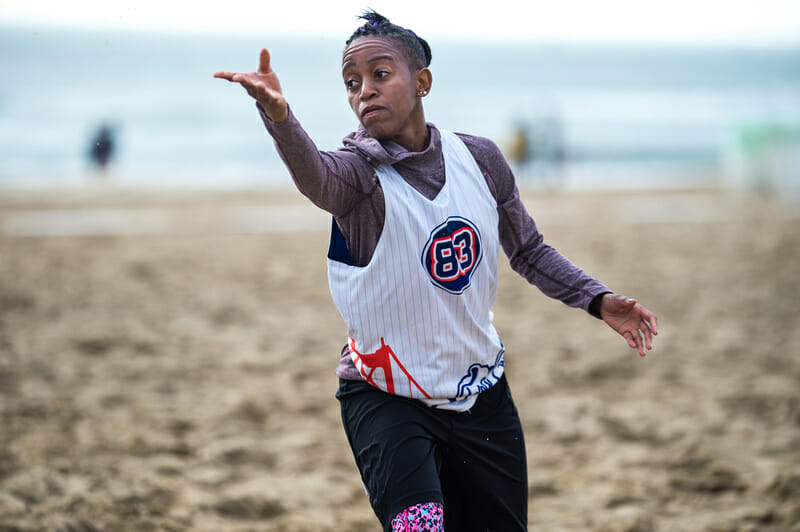Crawford has become one of the leading voices of racial equity in ultimate.
January 25, 2021 by Zoe Collins Rath in Profile with 0 comments

As a junior at the University of Georgia, Shanye Crawford looked out her window of the languages dorm to the quad and saw people throwing a disc, something she had never seen before. She went out, joined them and was drawn to it immediately.
“Then my best friend asked me to come out to a practice where I saw people doing even more things I had never seen before, but I just, I don’t know, it was like a magnet. I was just drawn to it,” she said.
She joined the women’s team at UGA and participated in various levels of the sport, even playing for nationally competitive clubs, Atlanta Ozone and Bucket, as well as coaching. Crawford was a key organizer of the Color of Ultimate game in Atlanta in 2019. Now, when she is not coaching, she is tutoring children in Spanish and leading an organization called Disc Diversity.
Disc Diversity recently announced that in the fall of 2021 there would be an inaugural tour of Black ultimate players. The team is set to feature core of 10 players, five men and five women, with the addition of local Black players at each of the three stops. The organization was born from Crawford being tired of options for consumption because it would be emotionally draining to see Black violence on screen.
“As soon as I felt the urge to complain, I said, ‘Oh, no, no, no, no, do something’,” she said.
That something: Disc Diversity, an organization that focuses on racial equity. She does podcasts each month to make the dialogue around racial equity more public.
Crawford created her own organization after a short stint as Equity, Diversity & Inclusion National Outreach Director for the youth division of USA Ultimate. But after feeling “tokenized,” as she put it, she left the position. Crawford talked about her experience on episode two of the Disc/Diversity podcast: Systematic Racism in Ultimate.
Besides podcasts, Crawford also does racial equity consulting for teams. All across the country and different divisions, teams reach out to Crawford to talk about racial equity and how the sport of ultimate can change, making it more equitable for Black players.
“I spoke to ten teams [last year], professional and club… and I was so encouraged by meeting with pockets all around our nation,” she said.
In an era where racial injustice has become a mainstream topic of discussion, interacting with people who may not look like you can be scary. But after talking with teams, Crawford was encouraged because she could see no difference between her life experiences and those of the faces in the sessions, who were mostly white.
“Race isn’t real… what was different was our social assignment,” she said.
She looked into the faces of someone who did not look like her and saw that, in some way, people from both groups felt the same pain. They were the same faces that had the same longings. But their social assignment, such as race, increasingly defined as a social construct that serves to divide people, was the difference.
For Crawford, this is just the beginning of her organization. She wants to do more, but what shape that will take is yet to be determined. Nevertheless, she wants to be seen as a businesswoman and hopes that people in ultimate can partake in initiatives to help improve the community.
“I am serious about putting the community first and being whatever they need,” she said.
The all-Black tour is an opportunity to get more Black athletes involved, something Crawford believes the community needs in order to be more inclusive of and enticing to the underrepresented group. A benefit of doing the tour is the ability to engage local youth players. But taking the angle of focusing on Black children and Black parents can be the difference.
“I want to get the hearts of the Black parents… who are correctly holding on to their precious babies right now, as they should,” she said. “I want them to not loosen the grip, but to give us the responsibility, give ultimate the responsibility… for holding seriously these gems of society.”
Crawford thought about the idea of reaching out to parents after the Color of Ultimate game. For the first time, she heard her own family locked into the game, talking about ultimate like they do with the NBA. Crawford has played ultimate for at least 16 years. She was taken aback because she knew the sport was exciting, but her family was just not catching on. But she realized something special about her family’s excitement.
“Every part of this game had you [Black people], at the center… and that’s why you were locked in,” she said.
While Crawford sees some smudges on the community, she is actively trying to better it. To her, bettering the community is giving them an opportunity to showcase the talents of Black players in ultimate and to show Black athletes that the ultimate community is a place for them, like it was for her. Crawford was fortunate enough to participate in ultimate in college, like many who discover the sport on or around campus. But if she were to participate in the sport now, she says she would feel hesitant and not rush into it in open arms.
“In 2020, I have seen a lot of talk but not a lot of action… I wouldn’t run all-heartedly into it. Like I did then, so I guess I’m lucky to have touched it when I did,” she said.
Now that she has touched the sport, she is trying to push the ultimate community to do better, specifically for Black people. From racial equity consulting and planning an ultimate tour, Crawford is a businesswoman who is trying all she can to push the sport of ultimate in a more welcoming direction.